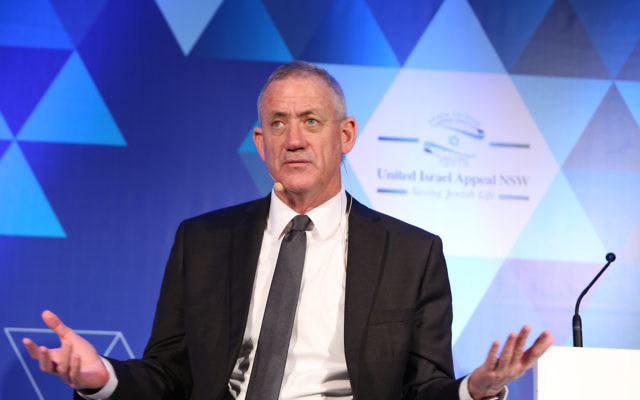Gantz tackles the big issues
A SOLD-OUT auditorium greeted former Israel Defence Forces chief Benny Gantz at the United Israel Appeal’s (UIA’s) general division eastern suburbs function on Monday night.
A SOLD-OUT auditorium greeted former Israel Defence Forces chief Benny Gantz at the United Israel Appeal’s (UIA’s) general division eastern suburbs function on Monday night.
Appearing in a Q&A format with Israeli journalist Yoav Limor, Gantz – who has been touted as a future prime minister – spoke about a number of issues currently facing Israel.
On Iran, he said the West could have gotten a better deal to curb its nuclear program, but chose to look at it from a glass half-full perspective.
“It keeps Iran from becoming potentially nuclear-capable for at least 10 to 15 years, which is a serious achievement in itself,” he said.
He added it was necessary to continue with operational and strategic preparedness while increasing intelligence and inspections in order to keep Tehran in check.
“At the same time I believe that we need to reach out to the Iranian people,” he said, while insisting he would “not be fooled around” by Iran.
“I know Israel’s defensive capabilities, more importantly I know Israel’s offensive capabilities. I know we are stronger,” he said.
In regard to Tehran’s sponsorship of terror, Gantz rued that terrorism “probably will be there forever” but Israel will “deal with it”.
“We should continue fighting terrorism. As long as we chase terrorists they will run away, if we run away they will chase us,” he said.
“But we should not change the way we live, we should not change the things we believe in, we should not change our values. We are much stronger than them. They know it.”
On the Gaza front, he said Israel needed to continue developing its intelligence, technology and operational readiness in case war again breaks out with Hamas, but stressed the level of deterrence since Operation Protective Edge was “very high”.
He added: “Everybody around us should remember that indeed there is a certain distance from Iran to Israel, from Lebanon to Israel, from Gaza to Israel, but let me assure you one thing: It’s a shorter distance the other way around.”
Despite the current political climate which sees Israelis and Palestinians further apart than ever, he said non-political elements on both sides understood that the societies needed to find a way to live together. “We should try to promote stability, we should try to promote economic events, but at the same time [maintain] security,” he said.
Despite the challenges, Gantz was optimistic about the future, citing two reasons. “One, I look at my kids … everything they do, they do better than us. We have a great young generation, which is a great promise for us.
“And I also know our tradition – we flourish by disagreeing with each other as long as we have an acceptable framework. There is an acceptable framework – it’s called Zionism.”
Gantz also touched on his time in the IDF, saying it was a “privilege” to serve.
He said his saddest memories on the job were losing soldiers – “You never get used to it. It’s always there on you, it’s tough” – while his happiest moment was seeing Gilad Shalit freed.
He also discussed ISIS, saying the terror group needed to be “exterminated totally”.
A poignant moment was provided when Gantz embraced Community Kashrut rabbinic administrator Rabbi Yedidya Krauthammer. Gantz’s mother saved the rabbi’s grandmother when both were in Bergen-Belsen.
GARETH NARUNSKY


comments